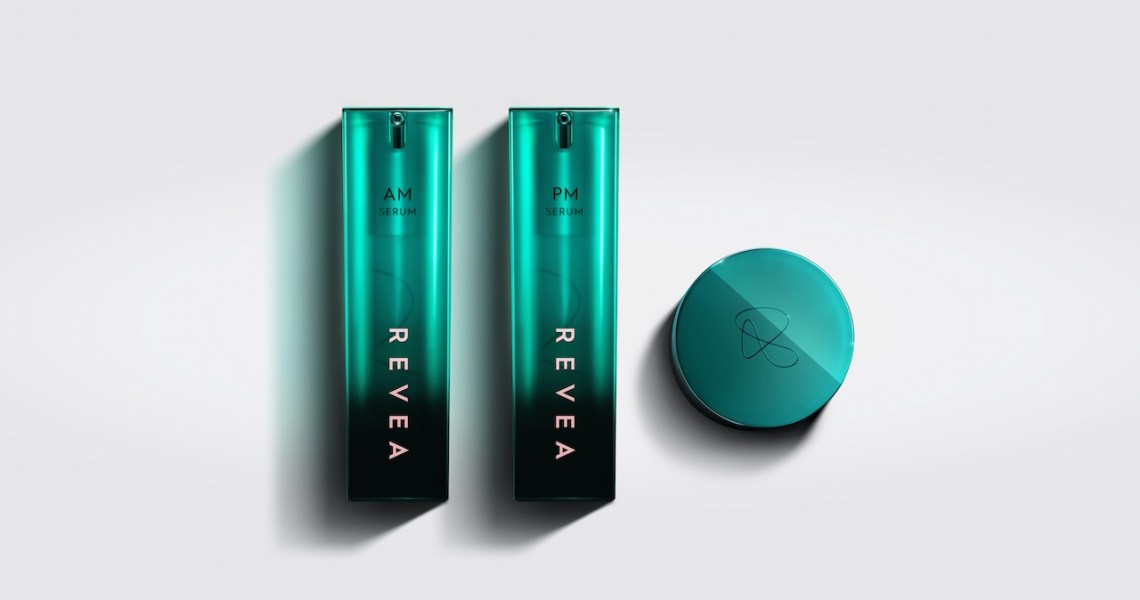After launching in April 2021 with a single storefront in San Francisco, precision skin-care brand Revea is planning to take the brand national with a skin-care app.
Chaz Giles, Revea founder and CEO, refers to “precision skin care” as going beyond traditional personalized or customized beauty. Revea announced on Thursday it raised a second seed fund, this time for $6 million, led by Alpha Edison with participation from Ulta Beauty and existing investor WaldenCast Ventures, among others. With this capital, Revea will launch an app in 2022, allowing Revea to bring its customized precision skin-care to people nationally. The app is currently in beta, while an existing dot-com site serves as a place for product and brand information, as well as consumer dashboards for tracking skin health. It’s not shoppable.
Revea has a San Francisco storefront outfitted with dermatological devices that, according to the company, measure a person’s skin hydration levels, sebum production and elasticity, among other factors. Based on these results, Revea formulates up to two custom serums and a moisturizer for each customer. The in-person appointments and three products cost $75 and $375, respectively. Traditionally, personalized or customized beauty products have been driven by questionnaires asking users questions about their skin type, concerns and skin tone. Revea previously raised $3.5 million in seed funding in March 2021.
“The investment Ulta Beauty has made in Revea underscores our continued commitment to digital innovation. The retail and beauty spaces continue to evolve, and consumers [now] move between digital and physical spaces more than ever — with fluidity and an expectation for personalized experiences,” said Prama Bhatt, chief digital officer at Ulta Beauty. “Revea is pushing the precision skin-care space forward and we are thrilled to champion the company as its new technology disrupts and pushes the space forward even further.”
This is not the first AI-led company Ulta Beauty has invested in. In June 2021, it invested in AI retail technology company Adeptmind. Separately, it committed to financially investing in more entrepreneurs of color by allocating $5 million in New Voices, a venture fund with that investment philosophy.
Giles said the Revea app will use hyperspectral imaging enabling the company to see below the epidermis layer of the skin to “get to the root cause” of a skin issue or concern. After receiving this information via an app user’s smartphone camera, Revea will use its artificial intelligence modeling to develop a unique skin profile and determine the right product formulas. Hyperspectral imaging collects hundreds of images at different wavelengths. It’s key to analyzing skin and hair features, detecting blood flow in the face, and deciphering the melanin and hemoglobin content of a person’s skin.
“With hyperspectral imaging and AI, we can create a precision skin-care experience that hasn’t been possible in the past,” said Giles. “In the past, all personalization relied on [steps] like asking the consumer what they seem to think is going on with their skin or what they’re experiencing. That’s been helpful, but it still doesn’t fully get to the root cause [of an issue].”
Ad position: web_incontent_pos1
Hyperspectral imaging and other advanced forms of imaging technology are a nascent but potentially integral part of scaling customized skin care. In Aug. 2021, Oddity, the parent company of beauty brand Il Makiage and Spoiled Child, acquired Israeli tech firm Voyage81 which specializes in hyperspectral imaging. Though brands like Neutrogena, Olay and Dermalogica have offered AI-driven skin analyses via apps and online for years, they sometimes involved clunky attachments (in the case of Neutrogena) or simply rendered simplistic and disparate analyses.
The app will be the primary sales channel for the brand, said Giles. Until now, Revea has only marketed and communicated to support its San Francisco store. But consumer willingness to download and use apps is uncertain. Data from app analytics company Data.ai (formerly App Annie) in 2020 found mobile users have 93 apps on their phone, as of the end of 2019, up from 85 apps at the end of 2015. They also now use around 41 apps per month, up from 35 in 2015. Yet, mobile app consultancy Heady found in a Feb. 2021 survey of smartphone users in the U.S. that 78% of people would refuse to complete a transaction if they were required to download an app in order to do so.
According to Giles, precision skin care can help people take control over their skin health and also address underserved customers, like people of color. People of different ethnicities and with melanated skin have unique skin concerns, such as higher sebum production, compared to Caucasian skin, and different sunscreen needs because traditional formulas can leave a residue.




